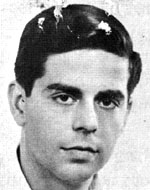Son of Daniel and Diana. He was born on December 21, 1936 in Tel Aviv. He completed his studies at Bialik Elementary School and continued his studies at Ironi Aleph High School. David was a smart and quick-thinking boy who had a lot of knowledge and knowledge and was more knowledgeable than boys his own age. However, because of these he did not tend to differentiate himself or patronize his friends; On the contrary, everyone knew him as a good-hearted, pleasant and kind boy. Many told him that he was a full-fledged friend of the word, willing to help and consider others. He participated with his friends in moments of joy and sorrow. Thanks to these qualities, he was surrounded by many friends who appreciated him greatly. With his friends he spent long conversations and discussions. Over the years he learned six languages that helped him in his future endeavors. After graduating from high school, he was accepted to study Arabic and the Middle East at the University of Jerusalem. After three years he was admitted as a graduate of the university on the subject of the Middle East. It was time to fulfill his duty and enlist in the IDF, but before that he married his girlfriend Rachel, who was drafted into the IDF in early February 1958 and assigned to the Intelligence Corps. After basic training he served as a teacher of Arabic and Middle Eastern sciences at the School of Political Science. His commanders greatly appreciated his work, his ability, and his devotion to the job. They noticed his intelligence, his intelligence, his quick perception, and his analytical ability. David was awarded the rank of sergeant. After being discharged from the army in 1961, he was appointed director of Middle Eastern and Israeli-Arab studies at the School of Political Science, and at the same time worked at the university and studied for his master’s degree in 1962. His son Eitan was born in 1962 and he tried to be close to him most of the time In 1964. He spent his studies in London and Paris in 1964. During this period he acquired a broad education, studied and understood various views and other ways of thinking, and in his spare time toured museums, , Traveled a lot and returned home full of impressions and experiences, and upon his return to Israel he returned to his work at the University of Jerusalem and in Jerusalem In 1966, he also taught at the University Institute in Haifa, and in March 1967 he was appointed to the center of the Middle East Studies Department in Haifa, where he volunteered to serve in the regular army as an adviser on Arab affairs in the Central Command. He was appointed an advisor on Arab affairs at the Judea and Samaria Command and was promoted to the rank of Major, and was occasionally promoted to abroad or to international conferences in which he was asked to speak. Very pleasant and pleasant. His friends in the unit assessed him as a positive person who contributed his skills to raising the level of the unit. In 1969 he was promoted to lieutenant colonel. In 1971, he was promoted to the rank of colonel, and at his request he took leave to complete his doctorate. When he returned from his leave, he continued his role. During the Yom Kippur War, he served in Judea and Samaria and was awarded the ‘Yom Kippur War’ in April 1974, where he again took an annual leave to serve as director-general of the Ministry of Information. As part of this role, he was invited to conferences around the world and lectured on the subject of Palestinian terrorism and problems relating to the Arabs in Israel. In 1975, he returned to his position in the IDF, where he divorced his first wife, and in the following year moved to serve in the General Staff as an adviser on Arab affairs, where he married Yehudit. He continued to fulfill his role with great devotion, but was unable to complete his work until the end of his contract. His direct commander respected his skills and qualities and noted him as an independent and entrepreneurial man with extensive professional knowledge and excellent public relations. David continued to do his job with great dedication, but was unable to complete his work until the end of his contract. On the 28th of Elul 5707 (May 3, 1977) he fell during his service and was brought to eternal rest in the military cemetery on Mount Herzl in Jerusalem. In a letter of condolence to the bereaved family, his commander wrote: “I met David for a long time, but only last year we worked together in daily contact, and I saw him as more than an officer-in-chief, an adviser and an assistant. We will remember him as he always was – energetic, helpful, conscientious, gentle, pleasant and friend. ” His family published a book in his memory and is about to publish his doctoral dissertation.
